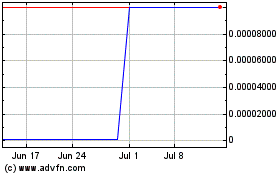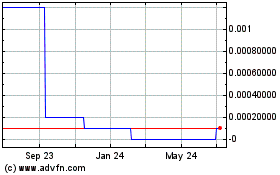Current Report Filing (8-k)
January 02 2018 - 6:08AM
Edgar (US Regulatory)
UNITED STATES
SECURITIES AND EXCHANGE COMMISSION
Washington, D.C. 20549
FORM 8-K
CURRENT REPORT
Pursuant to Section 13 or 15(d) of the
Securities Exchange Act of 1934
Date of Report (Date of earliest event reported):
December 31, 2017
|
SUNSET ISLAND GROUP
|
|
(Exact name of registrant as specified in its charter)
|
|
|
|
COLORADO
|
|
|
|
|
|
(State or other jurisdiction
of incorporation)
|
|
|
|
|
|
|
|
|
|
333-214643
|
|
|
|
47-3278534
|
|
(Commission
File No.)
|
|
|
|
(IRS Employer
Identification No.)
|
555 NORTH EL CAMINO REAL #A418
SAN CLEMENTE, CA 92672
|
(Address of principal executive offices) (zip code)
|
|
(424) 239-6230
|
|
(Registrant’s telephone number, including area code)
|
______________________________________________
(Former name or former address, if changed since last report)
Check the appropriate box below if the Form 8-K filing is intended to simultaneously satisfy the filing obligation of the registrant under any of the following provisions:
o
Written communications pursuant to Rule 425 under the Securities Act (17 CFR 230.425)
o
Soliciting material pursuant to Rule 14a-12 under the Exchange Act (17 CFR 240.14a-12)
o
Pre-commencement communications pursuant to Rule 14d-2(b) under the Exchange Act (17 CFR 240.14d-2 (b))
o
Pre-commencement communications pursuant to Rule 13e-4(c) under the Exchange Act (17 CFR 240.13e-4 (c))
|
Item 7.01.
Regulation FD Disclosure.
|
The Company has received number of inquiries from shareholders. The Company felt it was appropriate to answer the questions through an 8-K instead of emailing the individuals directly.
Q1. What is the status of the Company’s certification with Envirocann?
A1. The Company was certified by EnviroCann on August 11, 2017. The Company has decided not to renew its certification. A 3rd party certification is not required or necessary. The Company obtained the certification under the belief that it would allow the company to sell its product for a higher price. This belief was based on the fact that California had no testing requirements for cannabis and a certification from a 3rd party regarding pesticide use was thought to be an advantage. However, the Company learned that the buyers in California didn’t take the certification from Envirocann or any other 3rd party into price calculation. Additionally, On November 16, 2017, California’s three state cannabis licensing authorities publicly noticed proposed emergency regulations for commercial medicinal and adult-use cannabis.
Under the new regulatory scheme, cannabis products will need to be tested to measure the following: cannabinoids, (THC, CBD, and others), foreign material, heavy metals, microbial impurities, mycotoxins, moisture content and water activity, residual pesticides, residual solvents and processing chemicals, and terpenoids. Additionally, each batch will have to be tested for the above items. These test will be conducted by the licensed distributors and the lab conducting the tests will be able to randomly select samples for batch testing. As such, the grower or manufacturer no longer has control over the batch testing. When these new regulations were announced in November and to be effective on January 1, 2018, the need for 3rd party certification and testing became a non-issue as the for the first time California will have testing requirements for cannabis. Once the November 17, 2017 guidelines were announced the Company began to review the need for the Envirocann. The Company took into account the response from buyers about the certification, the impact of the new testing requirements and the fees associated with the certification. The cost to maintain the certification was estimated to be as high as $50,000 a year. This estimate was based on the Envirocann annual fee plus the $0.40 per square foot for each harvest. Based on those three factors the Company concluded that the certification was not worth the expense associated with it. A list of the California testing requirements along with each states testing requirements can be located by the link: State by State Testing Requirements.
In 1996, California became the first state to allows the sale of Cannabis. The new regulatory environment in California is continuingly to evolve and making changes to a 20-year old market that was essentially unregulated with regard to testing or quality standards. As such, the industry is currently in a state of flux and is changing at a rapid pace. These new regulatory and tax scheme on cannabis is part of California’s plan to eventually collect an estimated
$1 billion
in annual tax revenue from the legal adult-use marijuana industry. In order to collect $1 billion a year in taxes, the state will need to reach a
projected $7 billion in annual legal recreational cannabis sales
. The LA times published an articles that estimated the aggregate annual sales in medical marijuana were $2 billion a year (about 25% of total marijuana sales) and sales in the illegal market were $5.7 billion (75%). The goal would be with the new safety and quality testing standards the cannabis available on the legal market will be a safer and higher quality product than that on the illegal market.
SIGNATURE
Pursuant to the requirements of the Securities Exchange Act of 1934, the registrant has duly caused this report to be signed on its behalf by the undersigned hereunto duly authorized.
|
|
Sunset Island Group
|
|
|
|
|
|
|
|
Dated: December 31, 2017
|
By:
|
/s/ Valerie Baugher
|
|
|
|
Name:
|
Valerie Baugher
|
|
|
|
Title:
|
President
|
|
Sunset Island (CE) (USOTC:SIGO)
Historical Stock Chart
From Mar 2024 to Apr 2024

Sunset Island (CE) (USOTC:SIGO)
Historical Stock Chart
From Apr 2023 to Apr 2024
